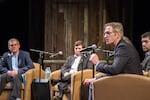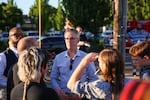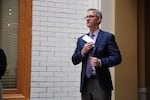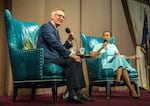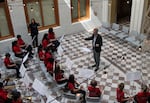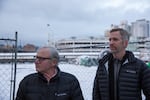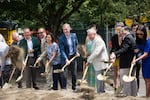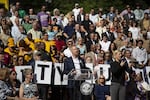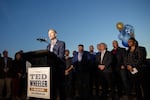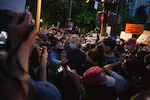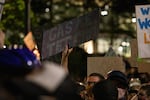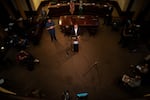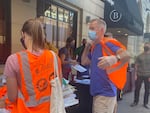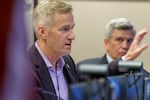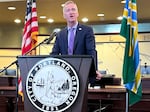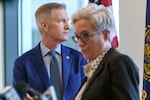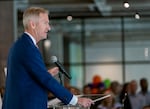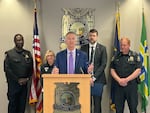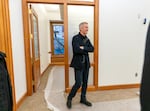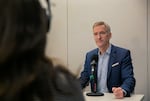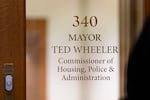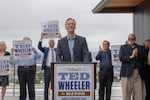
Oregon State Treasurer Ted Wheeler, officially announced his candidacy for Portland mayor, Wednesday, September, 9, 2015.
Andie Petkus
Portland Mayor Ted Wheeler has spent nearly two decades in elected office. That era ends Tuesday when Wheeler leaves City Hall, handing over the keys to Mayor-elect Keith Wilson and a brand new Portland City Council.
Since entering the mayor’s office in 2017, Wheeler has overseen a uniquely tumultuous period of time that included the COVID-19 pandemic, expansive racial justice protests, an explosion of deadly street drugs and a spike in homelessness. He’s also helped spearhead a historic transition to a new form of government, set in motion by voters in 2022, that required a complete overhaul to city management and its electoral system.
In a wide-ranging exit interview with OPB Portland city government reporter Alex Zielinski, Wheeler reflected on his tenure in office, offered advice to his successors and shared reasons Portlanders should be optimistic about the future.
This interview transcript has been edited for clarity and length. Listen to the complete conversation at the link below or by subscribing to OPB Politics Now anywhere you get your podcasts.
Alex Zielinski: How would you characterize your leadership style? And how has that changed since you entered office?
Ted Wheeler: I would describe myself as goal-oriented. I would describe myself as focused. I probably have become more of a big picture leader and less of a micromanager than when I started office, and I’ve certainly understood that different levels of government have to cooperate.
I don’t think I’m surprising anybody when I say that the relationship between the City of Portland and Multnomah County was terrible when I took office and for my first several years as the mayor of Portland, and we needed to work together. We had a growing homeless crisis. The county just fundamentally did not believe in shelter. They thought that that was a waste of money, a waste of resources. It took their focus off of building housing over the long term. But meanwhile, the city, Portland, was responsible for public safety, for maintaining public right of ways, for maintaining our green spaces and our parks, and we just could not get on the same page. And so with time, what I realized is we need to work with these folks because they provide mental health services, not the city. They provide substance use disorder treatment, not the city. They have navigation to housing that they create that we don’t have. And so it was like an escape room. We either all got out of the room together or we all stayed locked up in it.
Zielinski: Your successor, Keith Wilson, has a proposal to solve unsheltered homelessness. In 2017, you came in with a similar promise to move everyone into shelter within a couple of years. It didn’t happen for a lot of reasons. Looking back, what didn’t you know about homelessness then that you know now?
Wheeler: I would say that the dynamic of homelessness has shifted. I want to be very clear: It’s easy to stereotype homelessness as people having one set of circumstances or another. Homelessness is a catch-all for people who have fallen through a variety of safety nets. It could be that they have fallen into poverty, it could be that their rent has escalated, it could be that they have unaddressed mental health issues or substance use disorders. They maybe were released from our prison system at the state level recently without a clear plan of what they were going to do next. Or, all too often, they’re coming out of our youth system, they’re coming out of our foster care system and being transitioned basically onto the streets of our communities. I wouldn’t say it’s necessarily something I learned, but it’s something I feel more strongly about today, which is if you want to address homelessness, there is no magic bullet. It is a wide variety of social services interventions and economic interventions that need to happen in order to get people off the street.

Outgoing Portland Mayor Ted Wheeler, left, sits for an interview with OPB reporter Alex Zielinski in the Portland Building, Dec. 12, 2024. Wheeler says homelessness stems from diverse causes, requiring multifaceted social and economic interventions.
Anna Lueck for OPB / OPB
Zielinski: How do you see your role changing, or did you see your role changing after announcing that you weren’t going to run for reelection? Did it allow you to do more or to maybe give up some focus that you might’ve had if you were running for another four years?
Wheeler: [I focused on] the changes I needed to make in order to accommodate the new form of government. I chose to lead that effort as mayor, and I did not want to be running for election. I told my colleagues that I was taking all their bureaus back, and we consolidated them under an interim city administrator who I had hired for that purpose, Michael Jordan. We now have a team of deputy city administrators who work in our new cluster areas, which are groupings of bureaus that work horizontally with each other to solve similar types of problems. And that has been in place now for six months.
I mean, let’s just be honest. I’m also burned out. I need a break. But I felt that it would really inhibit our work to transition to the new form of government if I was also actively a candidate running for mayor at the same time that I was trying to consolidate power and authority within the executive branch that I just happened to oversee, I thought it would be a significant conflict of interest.
Zielinski: Speaking of being burnt out, I have a very vivid memory of interviewing you directly after being tear gassed by federal officials. At a work session this week, you said you haven’t seen your perspective reflected in coverage about 2020 protests. I’m curious, looking back, is there anything you would’ve done differently?
Wheeler: Would I have done things differently? I doubt it. And frankly, nobody could have seen 2020 coming. And it wasn’t just George Floyd and it wasn’t just COVID and it wasn’t just the economic lockdown and it wasn’t just the other social ills confronting our society and our community. It was all of the above. So I don’t think anybody realistically could have anticipated that. I think my team and I and my fellow city commissioners and our city employees, we did the best we could with the resources we had and the knowledge we had at the time to shift city resources towards those new concerns. Are there things I could have done differently? Yes, probably.
But I think it’s still a bit of an open question. And we put that learning what we thought we knew into effect for the election here in 2024. And we had better coordination. We had multi-jurisdictional support, we had all levels of government from the feds on down working with us. And no [protesters] showed up. So it was a success.
We got through election night without a single arrest, but we still have the question hanging out there: What if 500 angry people had shown up? Would things be fundamentally different from the way they were in 2020? And that’s the question that still remains hanging over the table.
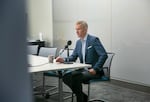
Reflecting on the unprecedented challenges during the 2020 protests, Ted Wheeler says uncertainties about preparedness still linger.
Anna Lueck for OPB
Zielinski: You said during your State of the City address that your “North Star” as a leader shifted while in office. What was your North Star when you entered office? What is it now and how did it change?
Wheeler: The question got more complicated with time. When I was elected Multnomah County Chair in 2006 and when I served as State Treasurer for six years, starting in 2010, I always saw myself not only as a public steward, but also as an advocate and representative of the public’s interests. When I became mayor, a question started to open in my mind, which is: Are you elected to represent the will of the community, or are you there to reflect on and represent specific programs and values that you have espoused? The reason this question became relevant is, when COVID hit and the economic shutdown happened and all of the resulting social problems happened, all of the sudden the public will shifted dramatically.
The question that I’m still asking myself today is, should I have reflected that shift in public will or should I have maintained a longer term view towards where I wanted the city to go? And I still haven’t completely reconciled that in my mind.
Zielinski: So you’re saying your motivation started as just reflecting the public interest, and then you shifted to thinking… “Should it be what I think is best for the city?”
Wheeler: The people of this city liberated me. They don’t realize it. I became a pariah, both of the left and the right, during the protests of 2020. You had the right saying I was aligned with Antifa and that I was not supportive of the police. You had the left saying exactly the opposite, that I was a tool of the Police Bureau, that I was in the pocket of the police union. So, basically, the city divorced me. And in that sense, that gave me clarity and it gave me freedom to do what I thought was the right thing to do.
Maybe I should have just all along focused on what I wanted to focus on, and maybe listened a little bit less to the angry voices – both on the left and the right – because in retrospect, I think they’re both wrong. There’s a lot to unpack there, and we’re still unpacking it today, not just here, but nationally. There’s a national reckoning happening around violence, and it’s a conversation we better have in this country and we better have it openly and we better have it right now.
Zielinski: You spent much of the last two decades in elected office, not just in Portland, but in the county and state. Over that time, trust in government has really wavered and plummeted. Why do you think that is?
Wheeler: First of all, let me just be completely clear: I don’t know. But let me speculate. Support for all institutions in our society has plummeted, whether it’s the government, whether it’s the media, whether it’s religious institutions, whether it is academia, whether it’s the corporate sector. We live in a time marked by distrust. And I think that distrust is coming from a broader sense that things aren’t moving in the right direction. We’ve certainly seen polling here in Oregon and in the city of Portland that suggests the public just thinks we’re moving in the wrong direction, that polling is reflected nationally. I think Americans generally, Portlanders specifically, are really anxious about the future. They’re anxious about their economics, they’re anxious for their children, they’re anxious about the trends they see in our society.
That’s the challenge for the incoming mayor and the incoming city councilors is to understand they will be governing at a time when people already don’t trust them, where people already are listening with an ear to failure. And what I want Portlanders to understand is no matter how tough things seem or how anxious people are, things are actually going pretty well for us here at City Hall.

Ted Wheeler, who describes himself as a "pariah" of both left and right during the 2020 protests, says public trust in institutions is low due to anxiety about the future, posing challenges for Portland's incoming mayor and city councilors.
Anna Lueck for OPB
Zielinski: How do you see yourself still investing in Portland while no longer in public office?
Wheeler: I feel very strongly about this and it’s maybe just my own value of civic engagement. Your ticket to complain is to participate, and there are plenty of people in our society who want to whine and complain, but they’re not willing to lift a finger to actually help move their community forward. That rankles me.
I was born and raised here. I know that the ethos of this community is direct engagement and participation in ways big and small. I will continue to be engaged in this community. I don’t know specifically in what way.
I need to step away first, I need to take some time with my family. My daughter’s a senior in high school. I want to spend a little bit of time with her before she’s launched into the world. But I have a very short attention span. I get restless very easily and I will stay engaged in the community. I just don’t know in exactly what capacity today.
Zielinski: Do you see yourself ever running political offices?
Wheeler: That’s not on my agenda. I’ve been in politics for 18 years. That’s a lot longer than I thought I’d be. And I’m really looking forward to doing something different. Maybe I’ll be engaged in some of the same types of issues, but from a different vantage point. I’m really looking forward to turning the page and doing something differently.
Zielinski: What are you looking forward to the most in leaving political office?
Wheeler: Not having my phone ring morning, noon and night, 365 days a year. And while I have been intentionally trying to reduce my stress levels and take care of myself physically, it’s really hard to do in that environment. And I’ve done it for a long time and I’m looking forward to taking a step back, reclaiming evenings and weekends for myself and for my family and regrouping and doing something new and different. This is the first time in probably 40 years where I didn’t actually know clearly what the next step was for me. And that’s on one hand, it’s kind of scary. On the other hand, it’s exciting.
Zielinski: Any lasting words of advice for incoming electeds, but also just for everyday Portlanders?
Wheeler: My advice to those who succeed me and succeed my fellow members on the city council, is stay the course. A lot of work went into the programs, the initiatives, the partnerships, the funding that is currently in place.
The results are really good, and they should stay the course and build upon what works. And they don’t have to take my word for it. The beauty is this is all objectively measurable, and they can look at the data and come to their own conclusions. But to me, it is overwhelmingly clear: Portland has turned around.
I’m asking the public to be open to the possibility that things are getting better. We have been trained to have a negative outlook about our community, about our state and our nation. But if you look at your neighbors, if you look at yourselves and your own families, there’s still a lot more good there than there are things to be afraid of.
I just really hope that people pull together in this community, support your mayor, support your city council, the way that people used to do in this community and work together to solve these problems, which I know people do. I work with people in the community each and every day all day long who are working to solve the problems of our community. And they’re winning, they’re succeeding. And I want more people to feel that sense of winning and succeeding. So be open-minded to it. That’s all I would say.

Ted Wheeler advises Portland's incoming mayor and city councilors to stay the course and build on successes, and he asks the public to be open to the possibility that things are getting better in Portland.
Anna Lueck for OPB / OPB


